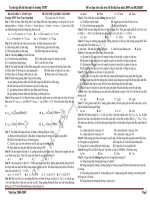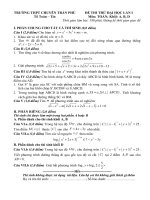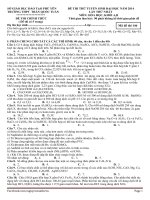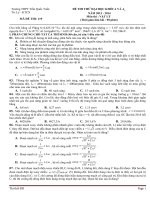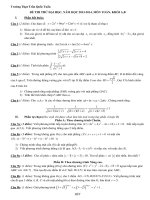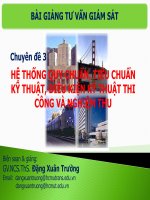- Trang chủ >>
- Đề thi >>
- Đề thi lớp 12
ĐỀ THI THỬ PHÚ QUỐC – KIÊN GIANG
Bạn đang xem bản rút gọn của tài liệu. Xem và tải ngay bản đầy đủ của tài liệu tại đây (608.06 KB, 7 trang )
Khoá học PRO S – luyện thi THPTQG 2017 – Cô Vũ Mai Phương – MOON.VN
TỰ TIN CHINH PHỤC KỲ THI THPTQG 2017
ĐỀ THI THỬ PHÚ QUỐC – KIÊN GIANG
Môn Tiếng Anh – Thời gian làm bài : 60 phút
Giáo viên: Vũ Mai Phương - MOON.VN
Follow FB: facebook.com/covumaiphuong
Cô Vũ Mai Phương
Mark the letter A, B, C, or D on your answer sheet to indicate the word whose underlined part differs from the
other three in pronunciation in each of the following questions.
Question 1: A. pressure
B. eldest
C. enjoy
D. attempt
Question 2: A. scholarship
B. character
C. charity
D. chemistry
Mark the letter A, B, C, or D on your answer sheet to indicate the word that differs from the other three in the
position of the primary stress in each of the following questions.
Question 3: A. determine
B. advantage
C. reviewer
D. currency
Question 4: A. diverse
B. campus
C. survive
D. decide
Mark the letter A, B, C, or D on your answer sheet to indicate the word or phrase that is OPPOSITE in meaning
to the underlined part in each of the following questions.
Question 5: Pollution growth rates vary among regions and even among countries within the same region.
A. stay unchanged
B: restrain
C. fluctuate
D: remain unstable
Question 6: She was brought up in a well-off family, so she can’t understand the problem we are facing.
A: poor
B: broke
C: wealthy
D: kind
Mark the letter A, B, C or D on your answer sheet to indicate the word(s) CLOSEST in meaning to the underlined
word(s) in each of the following questions.
Question 7: She was a devoted teacher. She spent most of her time teaching and taking care of her students.
A: intelligent
B: polite
C: honest
D: dedicated
Question 8: In some countries, the disease burden could be prevented through environmental improvements.
A. something bad
B. something enjoyable
C. something to entertain
D. something to suffer
Mark the letter A, B, C or D on your answer sheet to indicate the correct answer to each of the following
questions.
Question 9: A defensive player may only hold, block or pull a(n) …… who is touching or holding the ball.
A. opponent
B. referee
C. goalie
Question 10: If I had known you were in hospital, I ………… to see you.
D. audience
Khoá học PRO S – luyện thi THPTQG 2017 – Cô Vũ Mai Phương – MOON.VN
A. came
B. would have come
C. will come
D. would come
Question 11: His parents died when he was very small and he was ……….. by his grandmother and aunt.
A. brought up B. grown in
C. taken to
D. helped along
Question 12: By the end of next year, Mr. Park ……. for this company for 35 years.
A. will work
B. will have worked
C. will be working
D. has worked
Question 13: The discovery of the new drug is of great ………. for people suffering from heart problems.
A. signify
B. significant
C. significance
D. significantly
Question 14: We are going to have a trip to Hanoi. We need to ……….arrangement for the trip carefully.
A. pay
B. do
C. get
D. make
Question 15: My parents wouldn’t allow …….to the party.
A. me going
B. me go
C. me to go
D. to go
Question 16: There are a lot of ………advertised in newspapers. Why don’t you apply for one?
A. careers
B. vacancies
C. professions
D. work
Question 17: She asked him ……..on an excursion.
A. where has he gone
B. where he had gone C. where had he gone
D. where he has gone
Question 18: The later you get up, ……………..
A: the more you will feel tired and tired
B: you will feel more tired
C: the more tired you will feel
D: more tired will feel for you
Question 19: Scarcely ………out the house when it started raining.
A. he got
B. did he got
C. had he got
D. he had got
Question 20: I’m going to go out and ………..
A. have cut my hair
B. my hair be cut
C. have my hair cut
D. be cut my hair
Mark the letter A, B, C, or D on your answer sheet to indicate the most suitable response to complete each of the
following exchanges.
Question 21: At a supermarket, the customer is looking for something and ask the salesman for help.
- Customer: “…………”
- Salesman: “It’s over there, next to the tea and coffee.”
A. Excuse me, where’s the sugar?
B. Can you help me? I can’t carry the tea and coffee
C. How much is a kilo of tea and coffee?
D. I’m sorry. I didn’t buy the tea and coffee.
Question 22: It was the first time Laura visited Maria, and Laura praised Maria’s house.
- Laura: “What a lovely house you have!”
Khoá học PRO S – luyện thi THPTQG 2017 – Cô Vũ Mai Phương – MOON.VN
- Maria: “…………”
A: I think so
B: Thank you. Hope you will drop in
C: Of course not, it’s not costly
D: No problem.
Mark the letter A, B, C, or D on your answer sheet to indicate the sentence that best combines each pair of
sentences in the following questions.
Question 23: We spend about one-third of our life sleeping. We know relatively little about sleep.
A: Despite spending about one-third of our life sleeping, we know relatively little about sleep.
B: We spend about one-third of our life sleeping so that we know relatively little about sleep.
C: We shall know more about sleep if we spend more than one-third of our life sleeping.
D: We know relatively little about sleep, as a result, we spend about one-third of our life sleeping.
Question 24: The man wanted to get some fresh air in the room. He opened the window.
A: Having opened the window, the room could get some fresh air.
B: The man opened the window in order to get some fresh air in the room.
C: The man wanted to get some fresh air in the room because he opened the window.
D: The man got some fresh air in the room, even though he opened the window.
Mark the letter A, B, C, or D on your answer sheet to indicate the sentence that is closest in meaning to each of
the following questions.
Question 25: We didn’t go on holiday last year because we didn’t have enough money.
A: If we hadn’t had enough money, we wouldn’t have gone on holiday last year.
B: If we had had enough money, we would have gone on holiday last year.
C: Unless we had enough money, we would go on holiday last year.
D: If we hadn’t had enough money, we would have gone on holiday last year.
Question 26: Had I noticed that Joanne was crying, I would have called you.
A. Joanne was crying because I had called you.
B. If Joanne had been crying, I would have called you.
C. I called you because it was clear that Joanne was crying.
D. I did not see that Joanne was crying or I would have called you.
Question 27: “You’re always making terrible mistakes.” said the teacher.
A. The teacher complained about his students making terrible mistakes.
B. The teacher made his students not always make terrible mistakes.
C. The teacher asked his students why they always made terrible mistakes.
D. The teacher realized that his students always made terrible mistakes.
Khoá học PRO S – luyện thi THPTQG 2017 – Cô Vũ Mai Phương – MOON.VN
Mark the letter A, B C or D on your answer sheet to indicate the underlined part that needs correction in each
of the following questions.
Question 28: The more the relative humidity reading rises, the worst the heat affects us.
A
B
C
D
Question 29. Foreign students who are doing a decision about which school to attend may not know
A
B
C
exactly where the choices are located.
D
Question 30. He can’t hardly remember the accident because he was only a four-year-old boy when it
A
B
C
D
occurred.
Read the following passage and mark the letter A, B, C, or D on your answer sheet to indicate the correct word
or phrase that best fits each of the numbered blanks from 31 to 35.
THE HISTORY OF THE CINEMA
In Britain, the cinema was, without doubt, the most important form of public commercial entertainment of the
twentieth century. Until its popularity was eclipsed in the 1950s by television, cinema enjoyed a period of some
fifty years during ………..(31)……. its appeal far exceeded that of sport or indeed any other commercial leisure
activity.
The popularity of the cinema at that time is ……(32)…… difficult to explain: it was accessible, glamorous and
cheap. At its height, between 1920 and 1950, a very small sum of money would guarantee a good seat in the cinema.
In the 1920s, the usual venue was a small, neighborhood hall. The audience was drawn from the local area, and
could on some occasions be rather noisy. …….(33)………..by the end of the 1930s the venue was more likely to
be in one of the larger cinemas known as 'picture palaces', which were springing up everywhere in city centers to
……….(34)……… audiences of over two thousand people. In these establishments, the audiences were expected
to be well behaved; the performances were organized just like military operations, with uniformed staff on hand to
control the queues and usherettes to direct seating arrangements.
These large cinemas attracted a very mixed audience, although older people were less likely to be cinema-goers
than ………(35)……… As might be expected, people in rural areas were less immersed in the cinema than were
people in towns, simply because of the greater provision of cinemas in urban areas.
Question 31: A: why
B: which
C: where
D: when
Question 32: A: extremely
B: frequently
C: quickly
D: hardly
Question 33: A: However
B: Furthermore
C: Besides
D: Moreover
Question 34: A: accommodation
B: accommodator
C: accommodate
D: accommodating
Khoá học PRO S – luyện thi THPTQG 2017 – Cô Vũ Mai Phương – MOON.VN
Question 35: A: adolescents
B: usherettes
C: parents
D: audiences
Read the following passage and mark the letter A, B, C, or D on your answer sheet to indicate the correct
answer to each of the questions from 36 to 42.
What makes it rain? Rain falls from clouds for the same reason anything falls to Earth. The Earth’s gravity pulls it.
But every cloud is made of water droplets or ice crystals. Why doesn’t rain or snow fall constantly from all clouds?
The droplets or ice crystals in cloud are exceedingly small. The effect of gravity on them is minute. Air currents
move and lift droplets so that net download displacement is zero, even though the droplets are in constant motion.
Droplets and ice crystals behave somewhat like dust in the air made visible in a shaft of sunlight. To the casual
observer, dust seems to act in a totally random fashion, moving about chaotically without fixed direction. But in
fact dust particles are much larger than water droplets and they finally fall. The average size of the cloud droplet is
only 0.0004 inch in diameter. It is so small that it would take sixteen hours to fall half a mile in a perfectly still air,
and it does not fall out of moving air at all. Only when the droplet grows to a diameter of 0.008 inch or larger can
it fall from the cloud. The average raindrop contains a million times as much water as a tiny cloud droplet. The
growth of a cloud droplet to a size large enough to fall out is the cause of rain and other forms of precipitation. This
important growth process is called "coalescence".
Question 36: What is the main topic of the passage?
A. Types of clouds.
B. The mechanics of rain.
C. The weather patterns of North America.
D. How Earth's gravity affects agriculture.
Question 37: The word “minute” in the first paragraph is closest in meaning to which of the following?
A: slow
B. steady
C. second
D. tiny
Question 38: The word “it” in the second paragraph refers to …………
A: diameter inch
B. a cloud droplet
C. the average size
Question 39: Ice crystals do NOT immediately fall to Earth because ……………
A. most of them evaporate.
B. they combine with other chemicals in the atmosphere.
C. their electrical charges draw them away from the earth.
D. they are kept aloft by air currents.
D. moving air
Khoá học PRO S – luyện thi THPTQG 2017 – Cô Vũ Mai Phương – MOON.VN
Question 40: The word “random” in the second paragraph is closest in meaning to …………
A. independent
B. abnormal
C. unpredictable
D. perplexing
Question 41: What can be inferred about drops of water larger than 0.008 inch in diameter?
A. They are not affected by the force of gravity.
B. In moving air they fall at a speed of thirty-two miles per hour.
C. They never occur.
D. In still air they would fall to earth.
Question 42: How much bigger is the rain drop than a cloud droplet?
A. 200 times bigger.
B. 1.000.000 times bigger.
C. 1.000 times bigger.
D. 100.000 times bigger
Read the following passage and mark the letter A, B, C, or D on your answer sheet to indicate the correct
answer to each of the questions from 43 to 50
The atmosphere that originally surrounded Earth was probably much different from the air we breathe
today. Earth's first atmosphere (some 4.6 billion years ago) was most likely hydrogen and helium--.the two most
abundant gasses found in the universe--as well as hydrogen compounds, such as methane and ammonia. Most
scientists feel that this early atmosphere escaped into space from the Earth's hot surface.
A second, more dense atmosphere, however, gradually enveloped Earth as gasses from molten rocks within
its hot interior escaped through volcanoes and steam vents. We assume that volcanoes spewed out the same gasses
then as they do today: mostly water vapor (about 80 percent), carbon dioxide (about ten percent), and up to a few
percent nitrogen. These same gasses probably created Earth's second atmosphere.
As millions of years passed, the constant outpouring of gasses from the hot interior--known as out gassing
- provided a rich supply of water vapor, which formed into clouds. Rain fell upon Earth for many thousands or
years, forming the rivers, lakes, and oceans of the world. During this time, large amounts of carbon dioxide were
dissolved in the oceans. Through chemical and biological processes, much of the carbon dioxide became locked up
in carbon sedimentary rocks, such as limestone. With much of the water vapor already condensed into water and
the concentration of carbon dioxide dwindling, the atmosphere gradually became rich nitrogen.
It appears that oxygen, the second most abundant gas in today's atmosphere, probably began an extremely
slow increase in concentration as energetic rays from the sun split water vapor into hydrogen and oxygen during a
process called photodissociation. The hydrogen, being lighter, probably rose and escaped into space, while the
oxygen remained in the atmosphere.
This slow increase in oxygen may have provided enough of this gas for primitive plants to evolve, perhaps two to
three billion years ago. Or the plants may have evolved in an almost oxygen-free (anaerobic) environment. At any
rate, plant growth greatly enriched our atmosphere with oxygen. The reason for this enrichment is that plants, in
the presence of sunlight, process carbon dioxide and water to produce oxygen.
Khoá học PRO S – luyện thi THPTQG 2017 – Cô Vũ Mai Phương – MOON.VN
(by C. Donald Ahrens – “Meteorology Today – An Introduction to Weather, Climate and the Environment”)
Question 43: What is the main idea of the passage?
A. The original atmosphere on Earth was unstable.
B. The atmosphere on Earth has changed over time.
C. Hot underground gasses created clouds, which formed the Earth's atmosphere.
D. Plant growth depended on oxygen in the Earth's atmosphere.
Question 44: The word "enveloped" in the second paragraph is closest in meaning to ………..
A. escaped
B. changed
C. surrounded
D. characterized
Question 45: According to the passage, out gassing eventually led to all of the following EXCEPT ………
A. increases in the carbon dioxide content of sedimentary rocks
B. the formation of clouds
C. the formation of bodies of water
D. decreases in the level of nitrogen
Question 46: The word "they” in the second paragraph refers to
A. molten rocks
B. steam vents
C. volcanoes
D. gases
Question 47: The passage suggests that oxygen remained in the atmosphere because ……….
A. it was heavier than hydrogen
B. hydrogen became trapped in limestone
C. sun rays created equal amounts of hydrogen and oxygen
D. it was caused by outgassing
Question 48: The word "At any rate" in the fifth paragraph is closest in meaning to ………
A. regardless
B. fortunately
C. in addition
D. although unlikely
Question 49: The author organizes the discussion of the Earth's atmosphere in terms of the ………
A: occur in which changes occurred
B: role of volcanoes in its formation
C. time it took for the Earth's surface: to cool and nitrogen to appear
D. chemical and physical features of gasses
Question 50: Which of the following does the passage mention as necessary for both the production of oxygen by
photodissociation and the production of oxygen by plants?
A. Water
B. Nitrogen
C. Carbon dioxide
D. Hydrogen
